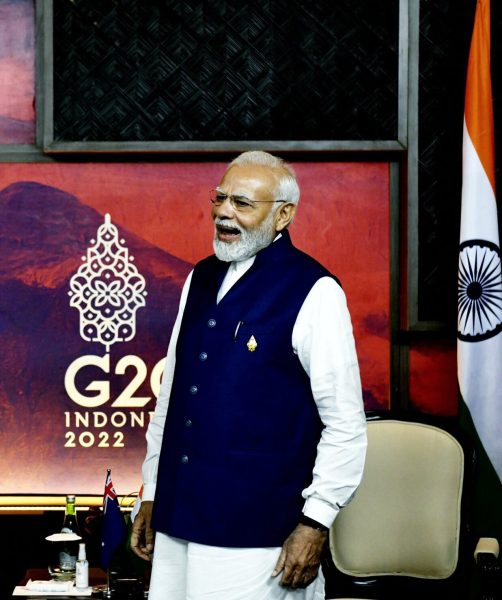
Not much to do at G20 but Modi will gain internally from presidency

Sections of people in India are understandably excited at the country assuming presidency of the world’s richest and powerful group of nations, the G20.
While the position is something to crow about as, on paper, it places New Delhi on top of the G20 heap, the sobering reality is that it is a ceremonial position. At most, what India says will be given a polite hearing and its views accommodated in any resolution.
In the declaration passed at the latest G20 in Bali, Indonesia, Prime Minister Narendra Modi’s much-quoted quote “today’s era must not be of war” found place. For a nation that has had difficulty in making itself heard on the international stage, the delight among his supporters was palpable.
Modi also found himself at the centre of the high table during the discussions and for the photo-op, all due to India’s position as the new president of the G20 group, which will satisfy the hordes of the ruling BJP’s supporters who have been desperate to see their leader as a “Vishwaguru”, or a world leader.
Also read: Modi promises ‘inclusive, ambitious, decisive, action-oriented’ G20 presidency
The G20 does not have a permanent secretariat or a headquarters. Whichever country is the president establishes a temporary secretariat for administrative purposes. For a year from now, the secretariat will be in New Delhi. The group’s president typically organises meetings and takes up the job of managing other activities. A summit is held each year, with the president usually playing the host. Next year’s summit will be during September in New Delhi.
Established in 1999, as G7, the group has grown into 19 nations and the European Union, making it 20 in all. It is essentially a group that focuses on economic cooperation, the world’s finances besides sustainable development. There is no political agenda.
G20 in a crisis
India takes charge as the president of the group at a time when the G20 itself is in a crisis. There is the ongoing and debilitating war between one of the members, Russia, and its neighbour Ukraine, a non-member. Nevertheless, by proxy, Russia is fighting the combined might of the US, UK, France, and Germany besides other NATO members in Europe. China is the only other big power that is with Russia.
India has been playing a delicate balancing role between the two warring sides. The one positive for the G20 with India as president is this role as a neutral party in the dispute. But, in terms of using its position as president to achieve peace in Ukraine appears far-fetched as there are complex issues between Russia and Ukraine that are largely bilateral, with obvious geopolitical ramifications.
Also read: Bali G20 meet: Modi reviews India-US ties with Biden, shakes hands with Xi
In the declaration at the Bali summit, the war found place due to its negative impact on the world’s economy. The declaration stated that the war was “causing immense human suffering and exacerbating existing fragilities in the global economy — constraining growth, increasing inflation, disrupting supply chains, heightening energy and food insecurity, and elevating financial stability risks.”
The declaration also acknowledged that the security aspects were beyond the scope of the G20. It merely pointed out “that security issues can have significant consequences for the global economy”.
China’s friction with India and the West
Lest one forgets, India has its own tensions in its bilateral relationship with China. Beijing will be closely watching New Delhi and would not hesitate to use its clout to stymie India if it attempts to do anything substantial or punch above its weight. China’s friction, meanwhile, is not limited to India alone, with Beijing finding itself on the side of Russia and on the wrong side of relationships with the US and the West.
US President Joe Biden and his Chinese counterpart Xi Jinping used the G20 meeting in Bali to have an independent discussion, but the issue of Taiwan, that in recent times has emerged as a point of tension between the two nations, remained unresolved.
Xi’s irritation with Canada was captured on video and circulated widely. Xi was seen admonishing Canadian Prime Minister Justin Trudeau for “leaking information from confidential talks between the two countries”. Trudeau rebutted it, saying the country was committed to free speech and transparency even if there were differences in their views. The video then went on to show both the leaders walking away from each other, their body language a testimony to a testy relationship.
It is in this context that India assumes presidency. More than what New Delhi will do or not do at the G20, the position afforded to India for the first time is a huge brownie point for Modi within India. With general elections in 2024, to be preceded by the G20 summit in September in New Delhi, the situation provides a great opportunity for India’s prime minister to preen before his domestic audience.
Not one to miss any opportunity to impress the local Indian electorate, the presidency will play a far more effective role in the BJP’s attempt to return to power. In a recent television discussion, a BJP leader, talking on an unrelated matter, loudly proclaimed that Modi was beyond any criticism, not only because he was India’s prime minister but also due to his newfound stature as a world leader — a sign of things to come as the country assumes the presidency of the G20.


